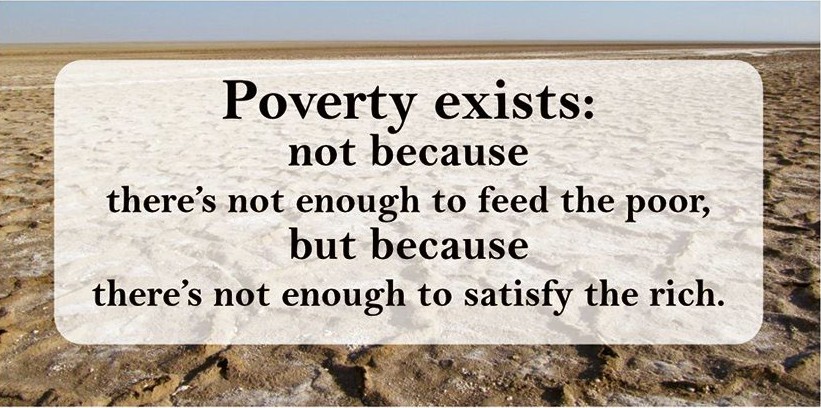Poverty exists: not because there’s not enough to feed the poor, but because there’s not enough to satisfy the rich.
ISN’T that true? The statistics are readily available. The world could produce enough food to feed every human. Around half of the food the world produces is consumed (or thrown away) by the wealthiest 10% of the population. Nearly half of the world’s wealth is owned by the richest 1%, while nearly 10% of its population lives in extreme poverty. Wealth inequality is a serious global problem.
Everyone agrees that something should be done about this. But what—and by whom?
Many charities and non-governmental organisations, as well as governments themselves, grapple with the problem. From time to time a concerted movement emerges, such as the ‘Make Poverty History’ campaign which burst on to the world stage in 2005 and, for a while, promised to make headway towards alleviating the suffering of the world’s poorest people. But the problem persists. And with the gathering climate crisis compounding the problems of economic inequality, corruption, and wars and unrest on a global scale, the solution seems to be as far away as ever.
A Prosperous Society
As far as we can tell, poverty has always been a problem, throughout the world and throughout history, even in the most affluent and peaceful societies. This makes the bold claim of the Bible seem almost outrageous:
There will be no poor among you; for the Lord will bless you in the land that the Lord your God is giving you for an inheritance to possess—if only you will strictly obey the voice of the Lord your God, being careful to do all this commandment that I command you today (Deuteronomy 15:4–5).
These were God’s words to Israel as they were poised to enter the Promised Land. It was a seminal moment in history—never before or since did God set up a nation, and give it a Law and a system of government.
For what great nation is there that has a god so near to it as the Lord our God is to us, whenever we call upon him? And what great nation is there, that has statutes and rules so righteous as all this law that I set before you today? (Deuteronomy 4:7–8).
With its emphasis on equality of all before the law (Leviticus 19:15), enforced periodic wealth redistribution (Leviticus 25), and the demand for high standards of personal morality (Leviticus 19:18), the Law of Moses (as it was called) was supremely fitted to eradicating poverty.
Interestingly, in the same chapter in which it says ‘there will be no poor among you’, it continues: ‘If among you, one of your brothers should become poor, in any of your towns within your land that the Lord your God is giving you, you shall not harden your heart or shut your hand against your poor brother, but you shall open your hand to him and lend him sufficient for his need, whatever it may be… For there will never cease to be poor in the land. Therefore I command you, “You shall open wide your hand to your brother, to the needy and to the poor, in your land”’ (Deuteronomy 15:7–8, 11).
That people will fall on hard times is a fact of life. Wealth inequality is inevitable in this age. The key, according to the Law of Moses, was that those who had wealth must look out for those who did not. This would enable poor people to live with dignity, and either them or the next generation to lift themselves out of their situation. Poverty would become a phase of life, not an inescapable fate.
So here is the solution. Governments and organisations will do what they can, but the onus is also on individual members of society to “open wide our hands”.
What, me? Here I am, struggling to make ends meet. I can point to many people who are much richer than me, and who (in my opinion) could well afford to give some away. But that’s not the point. Rather than looking at people who have more than me, I should be looking at those who have less.
The Law of Moses made generosity a commandment, and so did Jesus Christ himself:
Give, and it will be given to you. Good measure, pressed down, shaken together, running over, will be put into your lap. For with the measure you use it will be measured back to you (Luke 6:38).
The End to Poverty
In this present age, the scourge of poverty is a fact of life. But it will not always be so. The solution to this particular problem is the solution to all the world’s problems —the Kingdom of God which He has promised, which is so fully described throughout the Bible (and of which this magazine is dedicated to spreading the Glad Tidings).
So the most effective thing we can do to address the problem of poverty is to pray, as Jesus taught: ‘Your kingdom come, your will be done, on earth as it is in heaven’ (Matthew 6:10).




